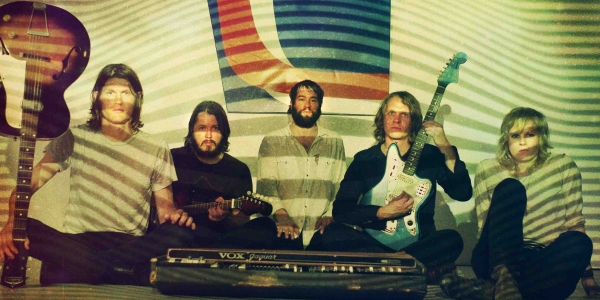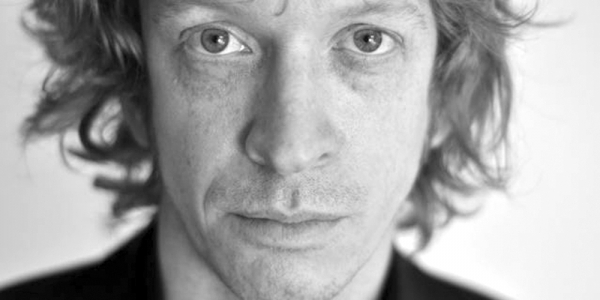The Black Angels formed originally in 2004. Vocalist and bass player Alex Maas had met guitarist Christian Bland “on a baseball field in Seabrook, Texas.” Both Maas and Bland had already developed an interest in psychedelia, and the pair’s common musical and artistic interests quickly spawned what became The Black Angels. On a pop cultural level Maas says his initial exposure to psychedelia was the television show The Twilight Zone; on a more spiritual level, Maas goes back – possibly facetiously – to his first moments on earth. “My first psychedelic experience was when I was brought into this world,” Maas says. “My pineal gland excreted a small amount of DMT into my bloodstream; this was my first psychedelic experience. It was amazing. Thank you human body,” he says. While the popular image of psychedelia tends to be dominated with references to drugs and colourful images, there is arguably a palpable spiritual aspect in any aspect of psychedelia. “Sure, spirituality exists in all life,” Maas says.
Naming itself after the Velvet Underground track The Black Angel’s Death Song (the band’s logo also features a negative image of Velvet Underground femme fatale Nico), The Black Angels released its first album, Passover, in 2006. With its heavy drone aesthetic, Passover located The Black Angels in the same psych-drone genre carved out and exploited by the likes of Spaceman 3, The Brian Jonestown Massacre and The Warlocks. The Black Angels’ second album, Directions to See A Ghost, followed in 2008. With the cover art again provided by Bland, Directions to See A Ghost proved The Black Angels’ initial critical success was no fluke.
On its third album, Phosphene Dream, The Black Angels have moved marginally away from the droning style of the first two records, embracing a more 60s garage edge, tempered with Revolver-era Beatles and Pink Floyd. Maas is circumspect on what led The Black Angels to explore more melodic musical territory. “We just wanted to evolve, really,” he says, matter-of-factly. The first single from Phosphene Dreams, Haunting at 1300 McKinley takes its title from the address where the band lived some years ago: Maas declines to confirm whether the house itself was a Grateful Dead-style house that captured a particular lifestyle commensurate with the band’s musical aesthetic.
In 2008 The Black Angels decided to organise a festival of psychedelic bands to play in the band’s hometown of Austin, Texas. Having played with such a rich tapestry of psych and drone bands over the short course of the band’s career, The Black Angels felt it was time to bring those artists together on the one bill. With acts ranging from The Raveonettes, Roky Erickson, Black Moth Super Rainbow, The Warlocks and Black Mountain, the Austin Psych Fest has become arguably the United States’ premier annual psychedelic festival. “We have had the chance to meet so many amazing artists in the course of our careers that we wanted to bring them all to Austin and throw a big psychedelic party,” Maas says.
The Austin Psych Festival was organised under the auspices of the Reverb Appreciation Society, a self-styled collective comprising members of The Black Angels. It’s a title that conjures up visions of society members sitting around in plush velvet robes reciting mediaeval texts, spliced in with droning chants. I’m wary of putting that scenario to Maas, but he does confirm that the Reverb Appreciation Society does indeed have its own creed. “Our motto is: ‘Help good music rise to the top’,” Maas laughs.
Around the same time Austin Psych Fest was being put together, The Black Angels were offered the chance to back legendary Thirteenth Floor Elevators vocalist, guitarist and songwriter Roky Erickson on one of his first touring forays since emerging from psychosis-induced hibernation. While Erickson’s return to the stage has been heralded far and wide, Maas admits the band had the odd concern about backing one of rock’n’roll’s most famous acid casualties. “Of course,” Maas says. “I described it as riding an untamed stallion with no reigns, or saddle and we are on the back riding blindly near a cliff. It was awesome!”
The collaboration with Erickson went off without a hitch – well, without any hitches that weren’t already factored into the tour’s planning. It’s long been rumoured that Erickson and The Black Angels are sitting on a bunch of covers of classic Erickson tracks. Maas confirms there’s another potential Erickson comeback record to follow his recent recording with Okervill River – though it’s not worth holding one’s breath for their official release. “Yes, there are ten unreleased Roky cover versions lying around that we have not been able to finish,” Maas says. “But we didn’t really get much positive feedback from his label or anyone in his camp about continuing the project, so it is shelved as of now. That’s gut wrenching.”







